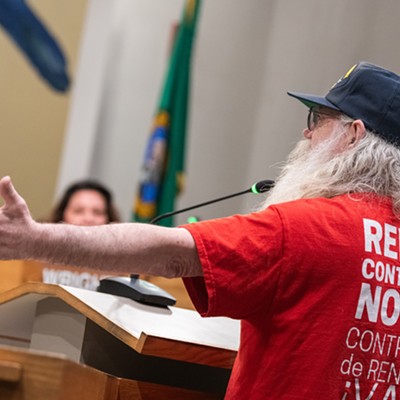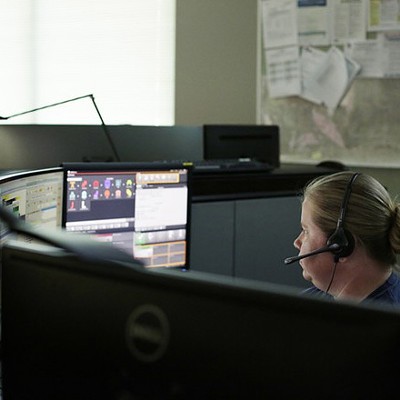Khost Stories
[
{
"name": "Broadstreet - Instory",
"component": "25846487",
"insertPoint": "4",
"requiredCountToDisplay": "4"
},{
"name": "Broadstreet - Empower Local",
"component": "27852456",
"insertPoint": "8",
"requiredCountToDisplay": "8"
},{
"name": "Broadstreet - Instory",
"component": "25846487",
"insertPoint": "12",
"requiredCountToDisplay": "12"
},{
"name": "Broadstreet - Instory - 728x90 / 970x250",
"component": "27852677",
"insertPoint": "18",
"requiredCountToDisplay": "18"
},{
"name": "Broadstreet - Instory",
"component": "25846487",
"insertPoint": "5th",
"startingPoint": "23",
"requiredCountToDisplay": "24",
"maxInsertions": 100
}
]
by Kevin Taylor & r & & r & & lt;span class= "dropcap " & S & lt;/span & aid Jawad, Afghanistan's ambassador to the United States, flew to Spokane last week where he met with local families who have a loved one deployed overseas.
"I was very touched to be able to talk to them," Jawad said later at Gonzaga University. "It is an honor and a pleasure to go and say thanks."
Jawad was frank and engaging during his remarks to a standing-room crowd of 240 at Gonzaga. He spoke of talking with a 10-year-old Spokane girl whose father is serving in Afghanistan, telling the girl her father's work is important because, if the country can achieve peace, 10-year-old Afghan girls will be able to go to school in safety and perhaps begin to break away from a feudal past.
Meanwhile, in the province of Khost near the Afghan-Pakistan border, Staff Sgt. Loretta Myers writes this:
"Tonight is a beautiful night but kind of freaky. It's a bright half-moon, there's dust in the air, and we can hear the Muslim death song coming from the nearby village. They are having their funerals from the bombing."
Myers is a 26-year-old nurse from Bonners Ferry who lives in Spokane Valley and works in Coeur d'Alene. She was among some 40 medical workers from Spokane deployed for a year in Afghanistan with an Army Reserve Combat Support Hospital and stationed at Camp Salerno in Taliban country. She writes about her experiences in e-mails made available through her family.
The experiences are by turn tragic:
"We did CPR on a 3-year-old for 10 minutes, then the kid got a pulse just to lose it for good. ... The docs tried everything, even placing an IV into the bone marrow. I have never done CPR on a kid before. It was harder than I thought it would be. I think the worst part would be the mom wailing in the background."
Reflective:
"When I first got here, I remember thinking, 'Man, I hope I don't think about Afghan people that way.' But now I think, 'Damn needy people always asking for a handout.' I know. I know that's a little harsh. It's just hard to deal with every day. They have absolutely nothing, so when they do get around you, they hound you nonstop."
And funny:
"I slept right through a mortar attack last night. That was funny. They told me about it in the morning, and I got in a little trouble 'cause I didn't report after the attack that I was OK. Oh well, we sleep in concrete buildings so mortars are not a big deal. They can't aim worth a damn, too."
Suicide Watch
Mullah Hayat Khan (variously identified as a Taliban commander or a Taliban spokesman) bragged to the media in late January that the extremist group has 2,000 volunteers for suicide missions in 2007. Suicide bombings have spiked along with the Taliban's push to reclaim Afghanistan. Pundits fear this terrible tactic is a spillover from Iraq and is an unintended consequence of the war there.
While pundits try to parse the military and political meanings, soldiers are doing what soldiers do best:
"We started counting them down. We were laughing in the bunker the other night saying, 'Well there are only 1,997 left,'" Myers wrote in an e-mail on Feb. 2.
The increase in suicide bombings caught many off guard.
"This is foreign to Afghans. Suicide bombing is unreligious and un-Islamic," Ambassador Jawad told his Spokane audience last week. And in the early days, the rare suicide bomber in Afghanistan was written off as a jihadi from elsewhere.
If that was ever true, it is no longer, Jawad and others admit. However, suicide bombing in Afghanistan differs significantly from Iraq, two researchers at the Jamestown Institute say, citing targets chosen and damage caused.
Dr. Brian Glyn Williams and Cathy Young conducted a five-month analysis of 158 suicide bombings in Afghanistan from 2001 through last month's attack at Baghram Air Base during Vice President Dick Cheney's visit.
A key difference: Iraqis target civilians to inflict high casualties, pit one faction against another and destabilize the central government. Meanwhile, the Taliban, who have only a tenuous hold on the hearts and minds of Afghans, try to avoid purely civilian targets and go after police or foreign military. By attacking "hard" targets, they have much less success penetrating armed and armored posts or convoys.
In 22 suicide attacks this year (through Feb. 27), the researchers found that, in 16 cases, only the bomber died. One policeman was killed in the 17th case, and the bomber was shot or arrested in two others. "Nineteen Taliban suicide bombers for one Afghan policeman ... hardly an inspiring kill-ratio," the researchers write.
Blowing Up Trust
Of the three attacks with significant casualties, two have come near Myers, one at the very gates of her base, Camp Salerno near the city of Khowst in Khost Province.
While few soldiers are killed, the Taliban bombers are hardly inept. There is a payoff. The mere threat of suicide bombers has made patrols and sentries more skittish in areas, such as Khost, where the Taliban vies for influence. The bombings lead to suspicion of Afghan civilians, and shootings of innocent bystanders by amped-up soldiers.
Canadian troops who used to deliver candy to children now have loudspeakers on their vehicles warning people to stay away. Dutch troops refuse to be deployed in areas where suicide bombings are prevalent, Glyn Williams and Young report.
As the bombings played out during February, Myers' e-mails showed similar effects: At one point, she got in a huge shouting match with an injured Afghan, refusing to let him take metal crutches home because she feared the hollow tubes could be packed with explosives.
Later she wrote, "Had an Afghan walk away from me toward a car ... My partner came out and told me he was a contractor and was OK. I thought I was going to have to shoot him because he didn't stop when I told him to. Guess I'm a little jumpy."
In roughly two months at Khost, the Spokane team has been through at least three suicide bombings, regular mortar and rocket attacks and has suffered the loss of eight soldiers from other units based at Salerno when a transport helicopter crashed.
And this is the quiet season, they say.
"My god, this is for real!" Myers wrote in late January. "We had a suicide bomber today hit the front gate. [Killing 10 Afghans and wounding 14.] I can't say too much. You probably heard the news 'cause it hit CNN 59 minutes after he blew. A lot died. I saw every one of them. The things I have seen, Mom. I can't get the smell out of my nose. ... I was in the hospital when I felt the explosion shake the ground. ... I wanted to write 'cause I knew you would hear Khowst and freak. I'm so tired. I'm going on 16 hours. I love you."
A month later: "We had another suicide bomber. This time it wounded two of our buddies, but not too bad. One just got it in the butt, which was pretty funny. We call him Forrest now (for Forrest Gump, who was shot 'in the butt-ocks'). ... In the news they said the Afghan army shot the bomber until he hit the ground and then detonated, but that's not true. They ran as soon as the bomber started yelling and reaching for the grenade. The American soldiers stood and fought. And they said only two got hurt. There were more than that. It's also way different up close and personal than just hearing it on the news. I can't tell you what it's like to see your friends come across your trauma table! We have been going nonstop since then. ... It doesn't seem like I can ever explain this place."
Coalition commanders issued a more thorough statement about the last bombing, noting seven U.S. soldiers were injured during the attack at the opening ceremony of a new emergency room at Khost City Hospital.
As the ceremony was about to begin, the bomber, dressed as a medical professional, was stopped by Afghan National Police inside the compound. As he was being questioned, he took off running towards the ceremony, the coalition account says. The onrushing bomber was shot by U.S. soldiers when he did not stop. One soldier wrestled the bomber to the ground, restraining him long enough to allow the crowd of people to move safely away. The soldier broke free before the grenade went off and sustained only minor injuries, the coalition says.
Such sacrifices by Americans resonate with many interested in a more peaceful future. "When President Karzai visited Washington, D.C.," Ambassador Jawad said last week, "the first place I took him was to Walter Reed Hospital. We met a mother with five sons. She is in her 40s and was injured building a road in Afghanistan. To see this," Jawad added, "it is hard for us to find the right words to say thank you."
"I was very touched to be able to talk to them," Jawad said later at Gonzaga University. "It is an honor and a pleasure to go and say thanks."
Jawad was frank and engaging during his remarks to a standing-room crowd of 240 at Gonzaga. He spoke of talking with a 10-year-old Spokane girl whose father is serving in Afghanistan, telling the girl her father's work is important because, if the country can achieve peace, 10-year-old Afghan girls will be able to go to school in safety and perhaps begin to break away from a feudal past.
Meanwhile, in the province of Khost near the Afghan-Pakistan border, Staff Sgt. Loretta Myers writes this:
"Tonight is a beautiful night but kind of freaky. It's a bright half-moon, there's dust in the air, and we can hear the Muslim death song coming from the nearby village. They are having their funerals from the bombing."
Myers is a 26-year-old nurse from Bonners Ferry who lives in Spokane Valley and works in Coeur d'Alene. She was among some 40 medical workers from Spokane deployed for a year in Afghanistan with an Army Reserve Combat Support Hospital and stationed at Camp Salerno in Taliban country. She writes about her experiences in e-mails made available through her family.
The experiences are by turn tragic:
"We did CPR on a 3-year-old for 10 minutes, then the kid got a pulse just to lose it for good. ... The docs tried everything, even placing an IV into the bone marrow. I have never done CPR on a kid before. It was harder than I thought it would be. I think the worst part would be the mom wailing in the background."
Reflective:
"When I first got here, I remember thinking, 'Man, I hope I don't think about Afghan people that way.' But now I think, 'Damn needy people always asking for a handout.' I know. I know that's a little harsh. It's just hard to deal with every day. They have absolutely nothing, so when they do get around you, they hound you nonstop."
And funny:
"I slept right through a mortar attack last night. That was funny. They told me about it in the morning, and I got in a little trouble 'cause I didn't report after the attack that I was OK. Oh well, we sleep in concrete buildings so mortars are not a big deal. They can't aim worth a damn, too."
Suicide Watch
Mullah Hayat Khan (variously identified as a Taliban commander or a Taliban spokesman) bragged to the media in late January that the extremist group has 2,000 volunteers for suicide missions in 2007. Suicide bombings have spiked along with the Taliban's push to reclaim Afghanistan. Pundits fear this terrible tactic is a spillover from Iraq and is an unintended consequence of the war there.
While pundits try to parse the military and political meanings, soldiers are doing what soldiers do best:
"We started counting them down. We were laughing in the bunker the other night saying, 'Well there are only 1,997 left,'" Myers wrote in an e-mail on Feb. 2.
The increase in suicide bombings caught many off guard.
"This is foreign to Afghans. Suicide bombing is unreligious and un-Islamic," Ambassador Jawad told his Spokane audience last week. And in the early days, the rare suicide bomber in Afghanistan was written off as a jihadi from elsewhere.
If that was ever true, it is no longer, Jawad and others admit. However, suicide bombing in Afghanistan differs significantly from Iraq, two researchers at the Jamestown Institute say, citing targets chosen and damage caused.
Dr. Brian Glyn Williams and Cathy Young conducted a five-month analysis of 158 suicide bombings in Afghanistan from 2001 through last month's attack at Baghram Air Base during Vice President Dick Cheney's visit.
A key difference: Iraqis target civilians to inflict high casualties, pit one faction against another and destabilize the central government. Meanwhile, the Taliban, who have only a tenuous hold on the hearts and minds of Afghans, try to avoid purely civilian targets and go after police or foreign military. By attacking "hard" targets, they have much less success penetrating armed and armored posts or convoys.
In 22 suicide attacks this year (through Feb. 27), the researchers found that, in 16 cases, only the bomber died. One policeman was killed in the 17th case, and the bomber was shot or arrested in two others. "Nineteen Taliban suicide bombers for one Afghan policeman ... hardly an inspiring kill-ratio," the researchers write.
Blowing Up Trust
Of the three attacks with significant casualties, two have come near Myers, one at the very gates of her base, Camp Salerno near the city of Khowst in Khost Province.
While few soldiers are killed, the Taliban bombers are hardly inept. There is a payoff. The mere threat of suicide bombers has made patrols and sentries more skittish in areas, such as Khost, where the Taliban vies for influence. The bombings lead to suspicion of Afghan civilians, and shootings of innocent bystanders by amped-up soldiers.
Canadian troops who used to deliver candy to children now have loudspeakers on their vehicles warning people to stay away. Dutch troops refuse to be deployed in areas where suicide bombings are prevalent, Glyn Williams and Young report.
As the bombings played out during February, Myers' e-mails showed similar effects: At one point, she got in a huge shouting match with an injured Afghan, refusing to let him take metal crutches home because she feared the hollow tubes could be packed with explosives.
Later she wrote, "Had an Afghan walk away from me toward a car ... My partner came out and told me he was a contractor and was OK. I thought I was going to have to shoot him because he didn't stop when I told him to. Guess I'm a little jumpy."
In roughly two months at Khost, the Spokane team has been through at least three suicide bombings, regular mortar and rocket attacks and has suffered the loss of eight soldiers from other units based at Salerno when a transport helicopter crashed.
And this is the quiet season, they say.
"My god, this is for real!" Myers wrote in late January. "We had a suicide bomber today hit the front gate. [Killing 10 Afghans and wounding 14.] I can't say too much. You probably heard the news 'cause it hit CNN 59 minutes after he blew. A lot died. I saw every one of them. The things I have seen, Mom. I can't get the smell out of my nose. ... I was in the hospital when I felt the explosion shake the ground. ... I wanted to write 'cause I knew you would hear Khowst and freak. I'm so tired. I'm going on 16 hours. I love you."
A month later: "We had another suicide bomber. This time it wounded two of our buddies, but not too bad. One just got it in the butt, which was pretty funny. We call him Forrest now (for Forrest Gump, who was shot 'in the butt-ocks'). ... In the news they said the Afghan army shot the bomber until he hit the ground and then detonated, but that's not true. They ran as soon as the bomber started yelling and reaching for the grenade. The American soldiers stood and fought. And they said only two got hurt. There were more than that. It's also way different up close and personal than just hearing it on the news. I can't tell you what it's like to see your friends come across your trauma table! We have been going nonstop since then. ... It doesn't seem like I can ever explain this place."
Coalition commanders issued a more thorough statement about the last bombing, noting seven U.S. soldiers were injured during the attack at the opening ceremony of a new emergency room at Khost City Hospital.
As the ceremony was about to begin, the bomber, dressed as a medical professional, was stopped by Afghan National Police inside the compound. As he was being questioned, he took off running towards the ceremony, the coalition account says. The onrushing bomber was shot by U.S. soldiers when he did not stop. One soldier wrestled the bomber to the ground, restraining him long enough to allow the crowd of people to move safely away. The soldier broke free before the grenade went off and sustained only minor injuries, the coalition says.
Such sacrifices by Americans resonate with many interested in a more peaceful future. "When President Karzai visited Washington, D.C.," Ambassador Jawad said last week, "the first place I took him was to Walter Reed Hospital. We met a mother with five sons. She is in her 40s and was injured building a road in Afghanistan. To see this," Jawad added, "it is hard for us to find the right words to say thank you."
















